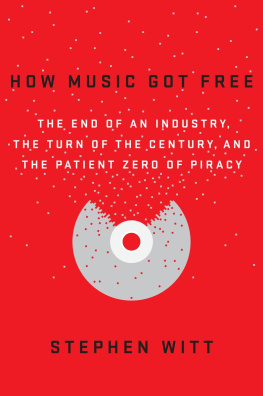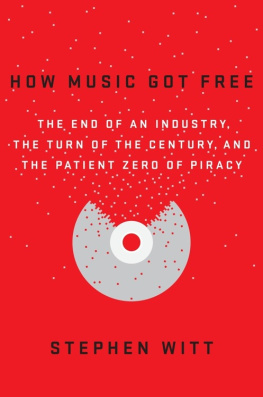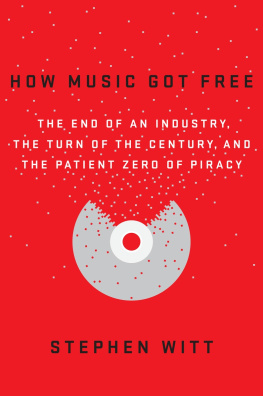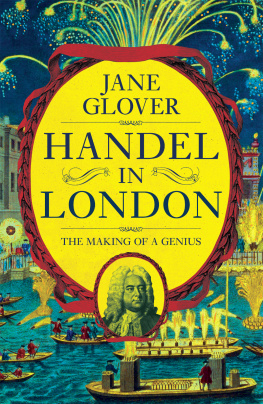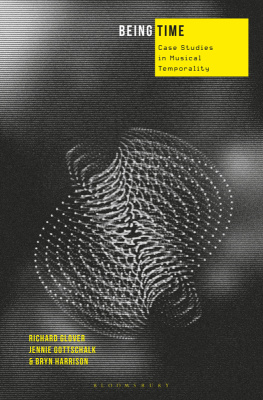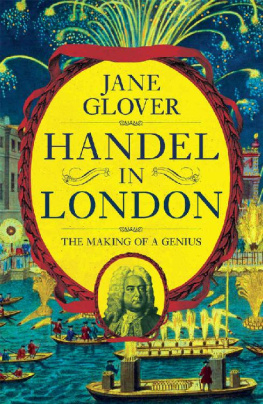Penguin supports copyright. Copyright fuels creativity, encourages diverse voices, promotes free speech, and creates a vibrant culture. Thank you for buying an authorized edition of this book and for complying with copyright laws by not reproducing, scanning, or distributing any part of it in any form without permission. You are supporting writers and allowing Penguin to continue to publish books for every reader.
Witt, Stephen.
Includes bibliographical references and index.
1. Sound recording industry. 2. Music and the Internet.
3. Sound recordingsPirated editions.
4. MP3 (Audio coding standard)History. I. Title.
INTRODUCTION
I am a member of the pirate generation. When I arrived at college in 1997, I had never heard of an mp3. By the end of my first term I had filled my 2-gigabyte hard drive with hundreds of bootlegged songs. By graduation, I had six 20-gigabyte drives, all full. By 2005, when I moved to New York, I had collected 1,500 gigabytes of music, nearly 15,000 albums worth. It took an hour just to queue up my library, and if you ordered the songs alphabetically by artist, youd have to listen for a year and a half to get from ABBA to ZZ Top.
I pirated on an industrial scale, but told no one. It was an easy secret to keep. You never saw me at the record store and I didnt DJ parties. The files were procured in chat channels, and through Napster and BitTorrent; I havent purchased an album with my own money since the turn of the millennium. The vinyl collectors of old had filled whole basements with dusty album jackets, but my digital collection could fit in a shoebox.
Most of this music I never listened to. I actually hated ABBA, and although I owned four ZZ Top albums, I couldnt tell you the name of one. What was really driving me, I wonder? Curiosity played a role, but now, years later, I can see that what I really wanted was to belong to an elite and rarefied group. This was not a conscious impulse, and, had you suggested it to me, I would have denied it. But that was the perverse lure of the piracy underground, the point that almost everyone missed. It wasnt just a way to get the music; it was its own subculture.
I was at the very forefront of the digital download trend. Had I been just a couple of years older, I doubt I would have become so involved. My older friends regarded piracy with skepticism, and sometimes outright hostility. This was true even for those who loved musicin fact, it was especially true for them. Record collecting had been a subculture too, and, for that vanishing breed, finding albums proved to be an exhilarating challenge, one that involved scouring garage sales, sifting through bargain bins, joining mailing lists for bands, and Tuesday visits to the record store. But for me, and those younger, collecting was effortless: the music was simply there. The only hard part was figuring out what to listen to.
As I was browsing through my enormous list of albums one day a few years ago, a fundamental question struck me: where had all this music come from, anyway? I didnt know the answer, and as I researched it, I realized that no one else did either. There had been heavy coverage of the mp3 phenomenon, of course, and of Apple and Napster and the Pirate Bay, but there had been little talk of the inventors, and almost none at all of those who actually pirated the files.
I became obsessed, and as I researched more, I began to find the most wonderful things. I found the manifesto from the original mp3 piracy clique, a document so old I needed an MS-DOS emulator just to view it. I found the cracked shareware demo for the original mp3 encoder, which even its inventors had considered lost. I found a secret database that tracked thirty years of leakssoftware, music, moviesfrom every major piracy crew, dating back to 1982. I found secret websites in Micronesia and the Congo, registered to shell corporations in Panama, the true proprietors being anyones guess. Buried in thousands of pages of court documents, I found wiretap transcripts and FBI surveillance logs and testimony from collaborators in which the details of insidious global conspiracies had been laid bare.
My assumption had been that music piracy was a crowdsourced phenomenon. That is, I believed the mp3s Id downloaded had been sourced from scattered uploaders around the globe and that this diffuse network of rippers was not organized in any meaningful way. This assumption was wrong. While some of the files were indeed untraceable artifacts from random denizens of the Internet, the vast majority of pirated mp3s came from just a few organized releasing groups. By using forensic data analysis, it was often possible to trace those mp3s back to their place of primary origination. Combining the technical approach with classic investigative reporting, I found I could narrow this down even further. Many times it was possible not just to track the pirated file back to a general origin, but actually to a specific time and a specific person.
That was the real secret, of course: the Internet was made of people. Piracy was a social phenomenon, and once you knew where to look, you could begin to make out individuals in the crowd. Engineers, executives, employees, investigators, convicts, even burnoutsthey all played a role.
I started in Germany, where a team of ignored inventors, in a blithe attempt to make a few thousand bucks from a struggling business venture, had accidently crippled a global industry. In so doing, they became extremely wealthy. In interviews, these men dissembled, and attempted to distance themselves from the chaos they had unleashed. Occasionally, they were even disingenuous, but it was impossible to begrudge them their success. After cloistering themselves for years in a listening lab, they had emerged with a technology that would conquer the world.
Then to New York, where I found a powerful music executive in his early 70s who had twice cornered the global market on rap. Nor was that his only achievement; as I researched more, I realized that this man was popular music. From Stevie Nicks to Taylor Swift, there had been almost no major act from the last four decades that he had not somehow touched. Facing an unprecedented onslaught of piracy, his business had suffered, but he had fought valiantly to protect the industry and the artists that he loved. To my eyes, it seemed unquestionable that he had outperformed all of his competitors; for his trouble, hed become one of the most vilified executives in recent memory.
From the high-rises of midtown Manhattan I turned my attention to Scotland Yard and FBI headquarters, where dogged teams of investigators had been assigned the thankless task of tracking this digital samizdat back to its source, a process that often took years. Following their trail to a flat in northern England, I found a high-fidelity obsessive who had overseen a digital library that would have impressed even Borges. From there to Silicon Valley, where another entrepreneur had also designed a mind-bending technology, but one that he had utterly failed to monetize. Then to Iowa, then to Los Angeles, back to New York again, London, Sarasota, Oslo, Baltimore, Tokyo, and then, for a long time, a string of dead ends.

